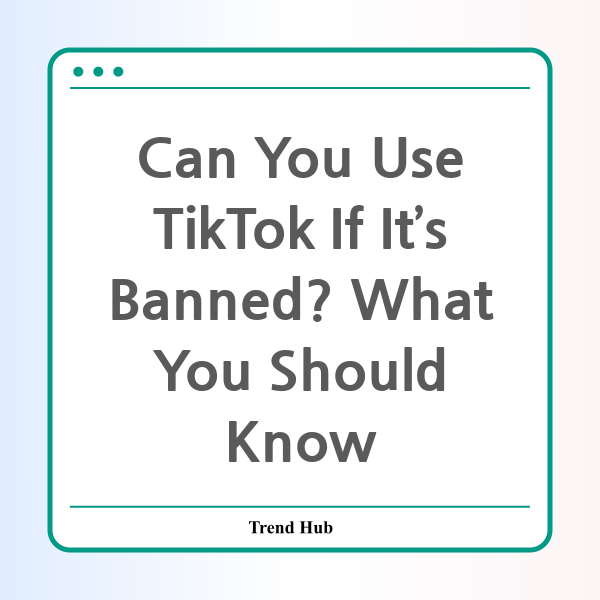* This website participates in the Amazon Affiliate Program and earns from qualifying purchases.

As the January 19 deadline approaches for the possible TikTok ban, a wave of uncertainty sweeps across its vast user base. This looming possibility raises a critical question: Will you still be able to use TikTok if it’s banned?
The app, owned by the Chinese company ByteDance, faces an impending shutdown that could affect millions of users in the U.S. A legal hearing has already hinted that if the Supreme Court does not intervene to halt the ban, TikTok could "go dark," meaning users attempting to log in might be met with a message directing them to download their data before the app ceases operations.
In the event of a ban, users currently active on TikTok might find themselves in a gray area. The law prohibits app stores and third-party service providers from hosting TikTok, but existing users would technically still have access to the app on their devices. However, without updates, the application’s functionality would likely degrade over time, potentially leading to a buggy, slow user experience.
Due to the anticipated restrictions on TikTok’s functionality, many users may consider using a VPN (Virtual Private Network) to bypass the ban. VPNs can make it appear as if users are accessing TikTok from a different location. Following the ban of another platform, demand for VPNs surged, even in the face of steep penalties for using such services. Experts suggest that while VPNs could provide a temporary workaround, they might not deliver the full TikTok experience, especially on mobile devices.
Kate Ruane from the Center for Democracy and Technology warns that, even with a VPN, the user experience could suffer. The necessity for data to travel greater distances could lead to slower video loading times, decreased quality, and frustrating glitches. Notably, many smartphones may not handle VPNs as efficiently as computers, which may further impede the TikTok experience.
The political landscape surrounding the TikTok ban adds another layer of complexity. Legislation has been introduced aiming to pause the ban for a longer period, yet the bipartisan support for the initial ban may hinder these efforts. Indeed, President-elect Donald Trump’s interest in pausing the ban could be significant, as his administration may create pathways for negotiations regarding TikTok’s ownership. The reality, however, is that ByteDance has firmly stated the app is not up for sale, complicating any potential resolutions.
For TikTok creators and users considering alternative platforms, the impending ban may prompt an urgent need to explore other social media channels. As the application potentially enters a downward spiral, leading to diminishing performance and usability, users would be wise to prepare for a transition.
In summary, the situation surrounding TikTok's functionality post-ban is fraught with uncertainty. While existing users may initially maintain access, the degrading service quality and potential use of VPNs may not offer a satisfactory user experience in the long term. With continued political negotiations seeming increasingly unlikely, many users may soon find themselves seeking new avenues for creative expression and connection online.
* This website participates in the Amazon Affiliate Program and earns from qualifying purchases.